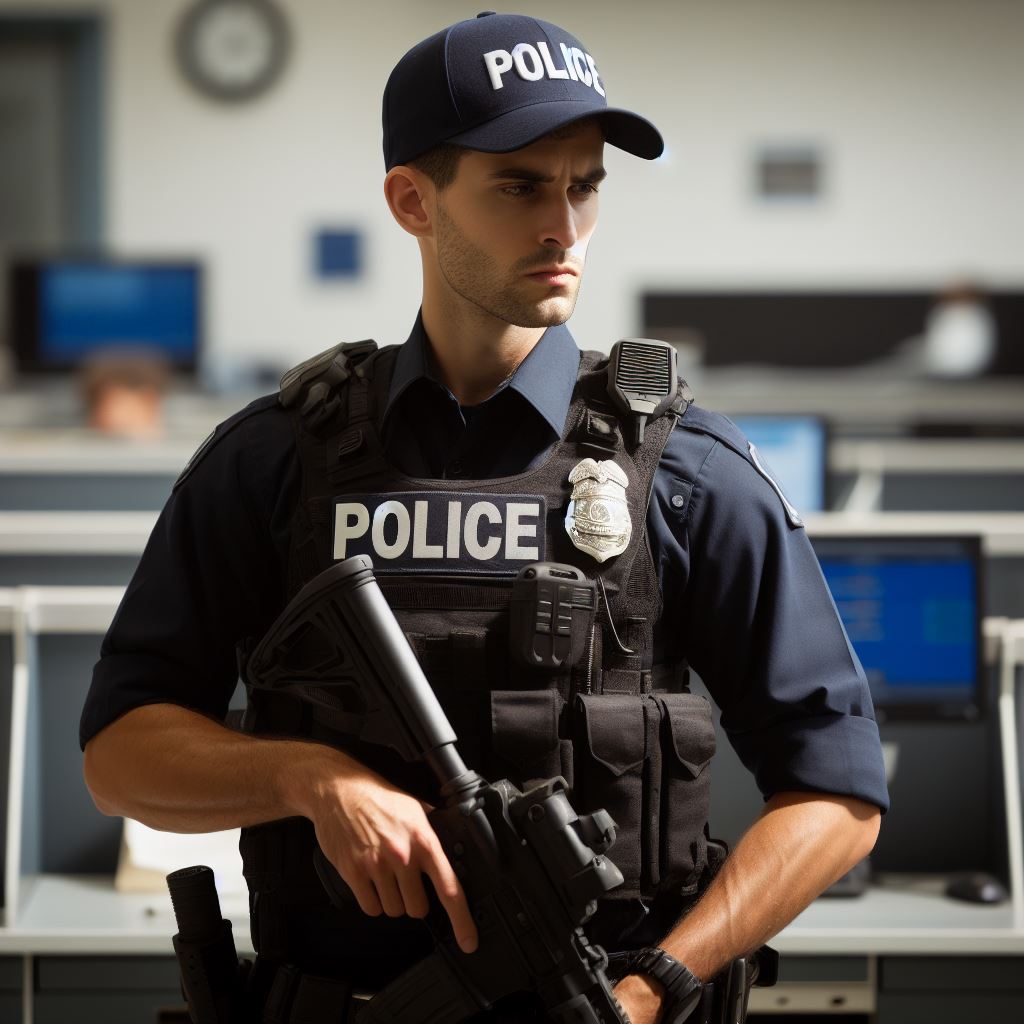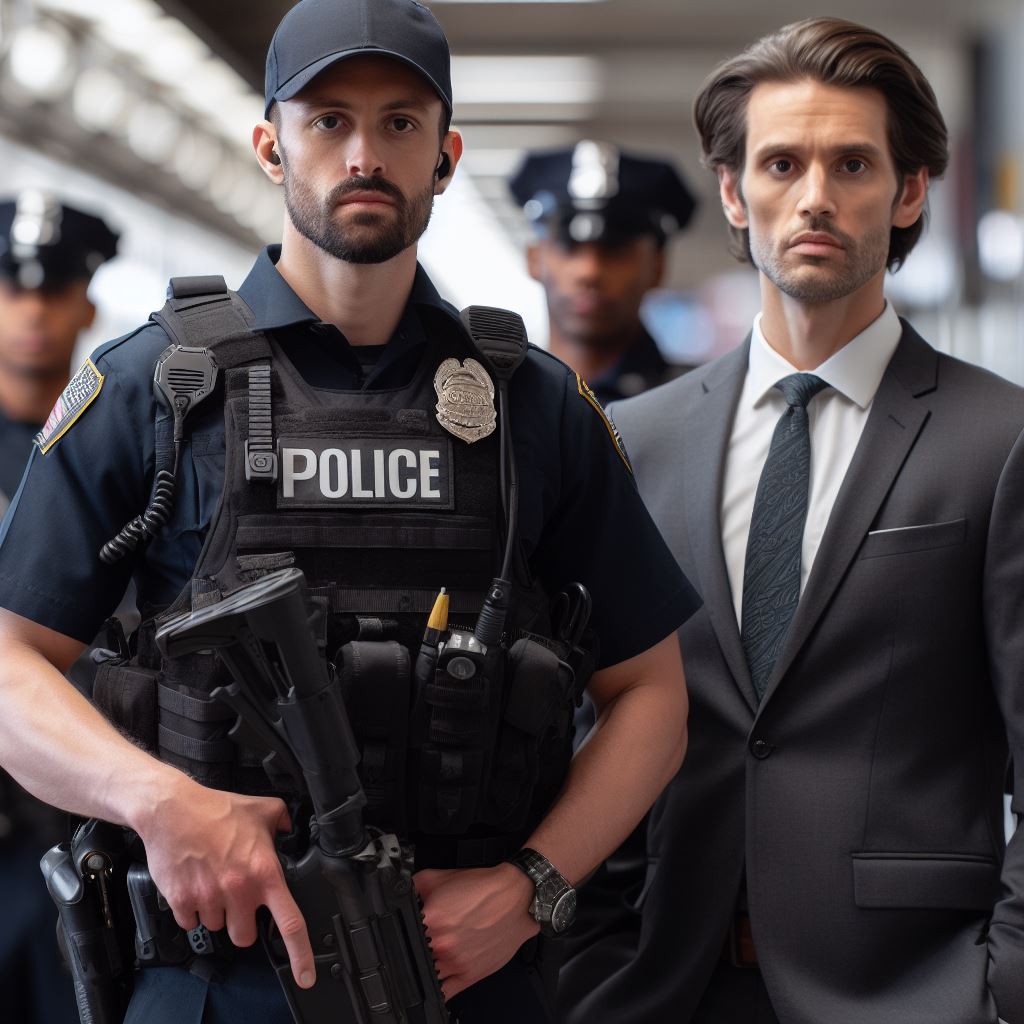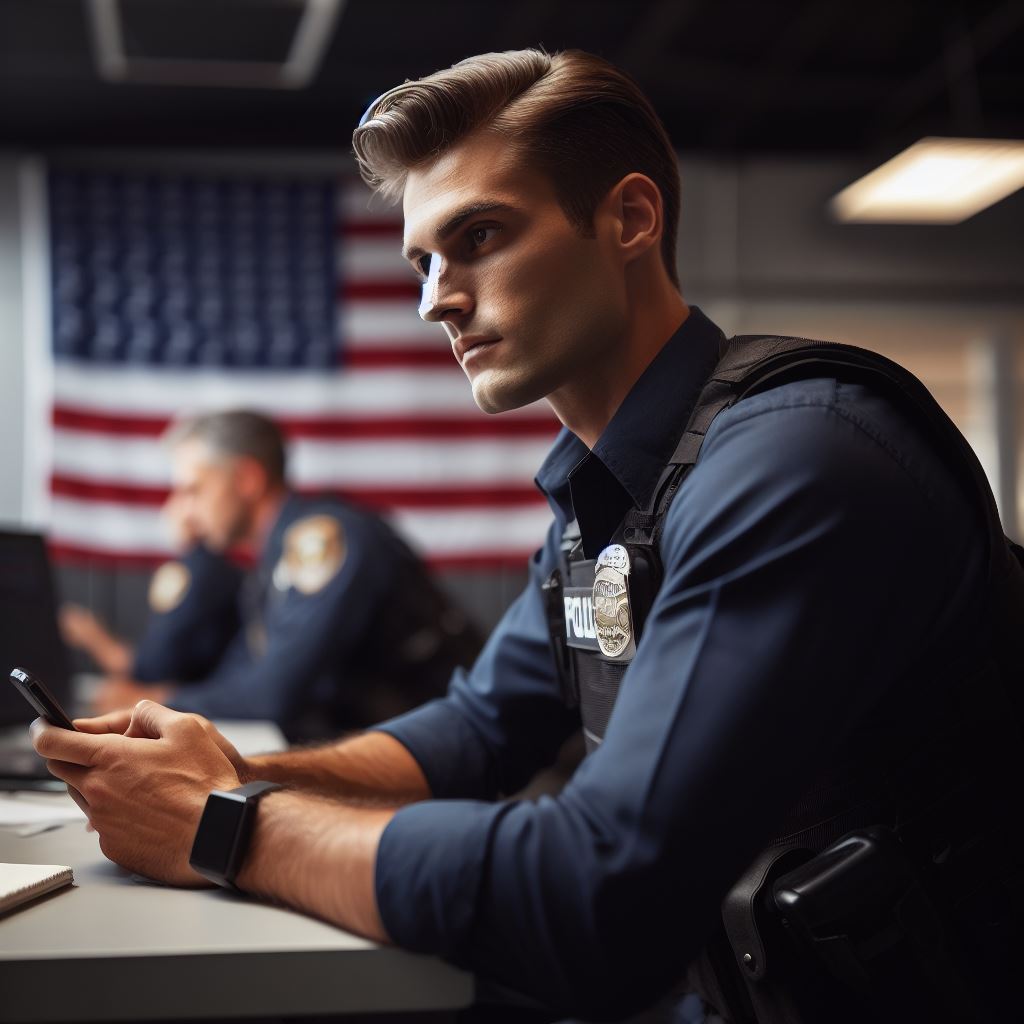Introduction
Importance and role of police officers in society
Police officers hold a crucial position in society, serving as the guardians of law and order.
They are responsible for protecting citizens, preventing crime, and ensuring the safety of communities. Without these dedicated individuals, chaos would prevail, and the societal fabric would crumble.
This blog post aims to shed light on the path to becoming a police officer in the USA. It will provide valuable information for those aspiring to join the force, outlining the necessary steps and requirements.
Firstly, aspiring police officers must meet certain prerequisites. These often include being a US citizen, possessing a valid driver’s license, and having a high school diploma or GED equivalent.
Additionally, candidates must pass physical fitness tests and undergo background checks to ensure their suitability for the role.
Upon meeting the initial requirements, individuals must complete the appropriate education and training.
Many police departments require candidates to attend a police academy, where they will receive comprehensive classroom instruction and practical training in various aspects of law enforcement.
After successfully completing the academy, aspiring officers may be required to undergo further on-the-job training, typically in a probationary period.
This period allows them to apply their knowledge and skills under the guidance of experienced officers.
To excel as a police officer, individuals should possess essential qualities such as integrity, compassion, and strong communication skills.
They must also demonstrate the ability to make quick decisions and remain calm in high-pressure situations.
In review, the journey to becoming a police officer in the USA requires commitment, dedication, and a strong sense of responsibility.
By following the necessary steps, aspiring officers can strive towards making a positive impact on their communities and upholding the values of justice and safety.
Qualifications and Requirements
Age and citizenship
- To become a police officer in the USA, you must be at least 21 years old.
- A valid US citizenship or permanent residency is required.
- Proof of citizenship or legal residency is usually provided through documents like birth certificates or passports.
Education and academic requirements
- Most police departments require a minimum of a high school diploma or GED.
- However, some agencies may prefer or require applicants to have a college degree.
- Applicants with higher education often have a competitive advantage during the selection process.
Physical fitness and health standards
- Physical fitness is vital in policing, as officers need to perform physically demanding tasks.
- Applicants are generally required to pass a physical fitness test, which includes tasks such as running, push-ups, and sit-ups.
- Medical examinations are conducted to ensure that individuals are in good health to perform the duties of a police officer.
Background check and moral character assessment
- Background checks are integral to the selection process for becoming a police officer.
- Applicants undergo thorough investigations into their criminal history, employment records, and personal references.
- Moral character assessments aim to evaluate an applicant’s integrity, honesty, and overall suitability for a career in law enforcement.
- Instances of prior criminal activity or misconduct can significantly impact an applicant’s chances of becoming a police officer.
Throughout the application and selection process, aspiring police officers need to meet these qualifications and requirements in order to be considered for a position.
The standards aim to ensure that individuals joining the police force are physically capable, possess the necessary education, exhibit good moral character, and are committed to serving and protecting the community.
It is essential to note that these requirements may vary slightly by state or agency. Some departments may have additional criteria or specific training programs that applicants need to complete.
Additionally, meeting the basic qualifications does not guarantee selection, as candidates must also pass written exams, interviews, and other assessments during the recruitment process.
Becoming a police officer is a noble and demanding career path that requires individuals to continually uphold the highest standards of professionalism, ethics, and public service.
Meeting the qualifications and requirements is just the beginning of the challenging journey towards becoming a law enforcement officer in the USA.
Application Process
Researching police departments and agencies
Before starting the application process, it is important to research different police departments and agencies in order to find the best fit for your career goals and aspirations.
Submitting the application
Once you have identified the police department or agency you wish to apply to, you must submit an application form, which can usually be found online on their official website.
Written exam
After submitting your application, you will be required to take a written exam to assess your knowledge and abilities in areas such as problem-solving, critical thinking, and decision-making.
Physical fitness test
Police work demands physical fitness, so candidates must pass a physical fitness test that includes tasks such as running, push-ups, sit-ups, and obstacle courses.
Oral interview
If you successfully pass the written exam and physical fitness test, you will be invited for an oral interview, where a panel will ask you questions about your motivations, skills, and experiences.
Background investigation
A thorough background investigation will be conducted to verify your personal, educational, and employment history, as well as any criminal records or previous police involvement.
Psychological evaluation
As part of the application process, you will undergo a psychological evaluation to assess your mental and emotional suitability for a career in law enforcement.
Medical examination
Finally, a comprehensive medical examination will be conducted to ensure that you meet the physical health requirements necessary to perform the duties of a police officer effectively.
By completing these steps in the application process, you are one step closer to fulfilling your dream of becoming a police officer in the USA.
Remember to stay committed, focused, and dedicated throughout the entire process!
Read: Rituals and Traditions in U.S. Firefighting Culture
Transform Your Career Today
Unlock a personalized career strategy that drives real results. Get tailored advice and a roadmap designed just for you.
Start NowPolice Academy Training
Duration and Curriculum Overview
- The police academy training typically lasts for several months.
- During this period, aspiring police officers undergo a comprehensive curriculum.
- The curriculum covers various aspects of law enforcement and prepares them for the realities of the job.
- Subjects include criminal law, ethics, community policing, investigative techniques, and more.
Classroom Instruction
- A significant portion of the police academy training involves classroom instruction.
- Experienced instructors teach recruits about laws, procedures, and best practices in law enforcement.
- Recruits learn how to analyze situations, make informed decisions, and effectively communicate with the public.
Physical Training and Defensive Tactics
- To ensure that recruits are physically fit for the job, they undergo rigorous physical training.
- This includes endurance exercises, strength training, and defensive tactics such as arrest techniques and self-defense.
- Recruits develop physical endurance, agility, and the ability to handle potentially dangerous situations.
Firearms Training
- Police officers need to be proficient in handling firearms, and the training in this area is critical.
- Recruits learn about firearm safety, marksmanship, and the appropriate use of force.
- They undergo extensive practice to improve their accuracy and response time in different scenarios.
Emergency Response and Vehicle Operations
- Learning how to respond to emergencies and operate vehicles safely is another essential aspect of training.
- Recruits are taught how to handle high-stress situations, prioritize tasks, and provide assistance to those in need.
- They receive training on driving techniques, pursuit policies, and traffic laws to ensure public safety.
Case Studies and Simulations
- Real-life case studies and simulations help recruits apply their theoretical knowledge to practical situations.
- They analyze crime scenes, conduct investigations, and make decisions based on the information presented.
- This training enhances their critical thinking, problem-solving, and decision-making skills.
Graduation Requirements
- Before graduating from the police academy, recruits must meet certain requirements.
- They must pass written exams, practical assessments, physical fitness tests, and firearms proficiency tests.
- Furthermore, recruits are expected to maintain high standards of conduct and professionalism throughout the training.
Read: Volunteer Firefighters: The Unsung Heroes in the U.S.

Field Training and Probationary Period
Purpose and structure of field training
- Field training serves to bridge the gap between academic learning and practical application.
- The structure involves newly hired officers being assigned to experienced mentors for hands-on training.
- During this period, trainees gain valuable insights and learn how to perform their duties effectively.
Riding along with experienced officers
- To enhance their understanding, trainees accompany experienced officers on patrol.
- They observe and learn the various techniques and strategies employed in real-life situations.
- This hands-on experience helps them develop practical skills required for the job.
Applying learned skills in real-life situations
- Trainees have the opportunity to apply the knowledge and skills they acquired during training.
- By facing real-life scenarios, they learn to assess situations and make quick decisions.
- It helps them build confidence and adaptability in handling challenging and unpredictable situations.
Evaluations and performance assessments
- Throughout the field training, trainees receive regular evaluations and performance assessments.
- Experienced officers provide feedback and guidance to help them improve their skills and performance.
- These evaluations serve as a tool to monitor progress and ensure trainees meet the required standards.
Transition to independent patrol
- Once trainees demonstrate proficiency in their roles, they can transition to independent patrol.
- They have gained sufficient experience and are deemed ready to handle responsibilities on their own.
- However, they continue to receive support and guidance from supervisors during this stage.
Duration and requirements of probationary period
- The probationary period typically lasts for a specific number of months, depending on the department’s policy.
- During this time, probationary officers are closely monitored and evaluated.
- They must meet specific requirements and demonstrate their ability to perform the duties of a police officer effectively.
Basically, the field training and probationary period play significant roles in the path to becoming a police officer in the USA.
Through field training, trainees gain practical experience, apply their learned skills, and receive evaluations to ensure they meet the required standards.
Once they successfully complete this period, they transition to independent patrol and enter the probationary period, where they are closely monitored and evaluated.
The probationary period serves as a final assessment of their capabilities before fully becoming a police officer in the USA.
Read: Fire Department Hierarchies: From Rookie to Chief
Specialization and Career Advancement
Opportunities for specialization within the police force
Specialization options exist in various areas such as forensics, cybercrime, narcotics, and traffic enforcement.
These specialized units allow officers to focus on specific types of investigations and law enforcement.
Promotional paths and ranks
Police officers can advance their careers through promotions to higher ranks within the department.
Common ranks include sergeant, lieutenant, captain, and chief.
Promotions are usually based on experience, skills, performance, and completion of required training.
Continuing professional development and training
Ongoing training is crucial for police officers to stay updated with the latest techniques and legal developments.
Training programs cover topics such as firearms handling, emergency response, crisis negotiation, and cultural sensitivity.
Officers can attend seminars, workshops, and courses to enhance their knowledge and skills.
Transition to supervisory roles
Some officers may choose to transition to supervisory or management positions as they progress in their careers.
These roles involve leading and overseeing a team of officers, ensuring compliance with department policies and procedures.
Supervisory positions require strong leadership, communication, and decision-making skills.
Potential for advancement to specialized units or detective work
With experience and additional training, officers can become eligible for specialized units within the police force.
Specialized units may include SWAT teams, K-9 units, hostage negotiation teams, or crime scene investigation.
Detective work involves investigating and solving complex criminal cases, often requiring advanced investigative skills.
Advancement to these roles is highly competitive and typically based on an officer’s performance and experience.
Essentially, the path to becoming a police officer in the USA offers opportunities for specialization and career advancement.
Officers can choose to specialize in areas such as forensics or narcotics and can advance through promotional ranks based on their skills and experience.
Continuous professional development and training are essential for staying current in the field.
Transitioning to supervisory roles or specialized units, such as detective work, is also possible with the right experience and qualifications.
Showcase Your Business Today
Reach thousands of readers actively exploring professional services. Publish your business profile and grow your audience now.
Publish NowRead: Key Skills Every U.S. Firefighter Must Possess
Discover More: Top U.S. Cities with the Highest Demand for Security Personnel
Conclusion
After exploring the path to becoming a police officer in the USA, it is evident that this career choice requires dedication, commitment, and a strong sense of responsibility.
Throughout the journey, aspiring individuals must first meet the basic requirements, such as having a high school diploma or GED equivalent, being at least 21 years old, and possessing a valid driver’s license.
Next, they must undergo a rigorous selection process that includes a written exam, physical fitness test, background investigation, and interviews.
Once accepted into the police academy, recruits undergo rigorous training in various aspects of law enforcement, including firearms training, defensive tactics, and emergency response.
Upon successful completion of the training, individuals become sworn police officers and begin their careers within their respective departments.
It is crucial to highlight the significant commitment and sacrifice required to serve as a police officer, as they often face dangerous situations and work long hours to protect and serve their communities.
However, despite the challenges, aspiring individuals should be encouraged to pursue their dream of becoming a police officer if they possess the necessary qualities and a genuine desire to make a positive difference in society.
By choosing this honorable profession, individuals have an opportunity to play a vital role in maintaining law and order, promoting community safety, and serving as pillars of support for their fellow citizens.
So, if you have the passion, dedication, and the bravery to confront challenges head-on, the path to becoming a police officer in the USA is waiting for you.
Start your journey today and make a lasting impact on your community.
[E-Books for Sale]
The Big Book of 500 High-Paying Jobs in America: Unlock Your Earning Potential
$19.99 • 500 High-Paying Jobs • 330 pages
Explore 500 high-paying jobs in America and learn how to boost your career, earn more, and achieve success!
See All 500 High-Paying Jobs of this E-Book
1001 Professions Without a Degree: High-Paying American Jobs You Can Start Now
$19.99 • 1001 Professions Without a Degree • 174 pages
Discover 1001 high-paying jobs without a degree! Unlock career tips, skills, and success strategies for just $19.99!




